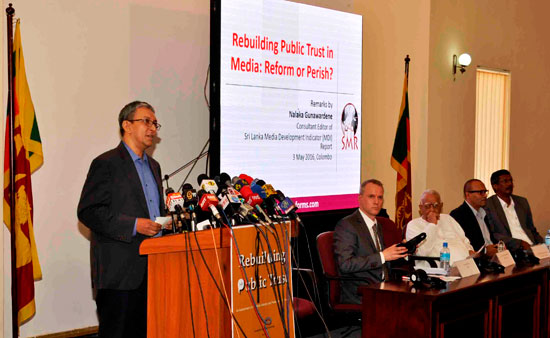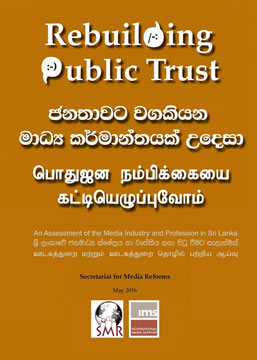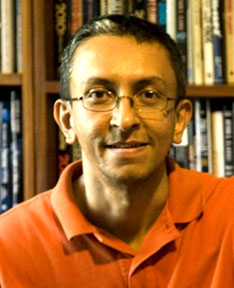|
Major reforms needed to rebuild public trust in Sri Lanka’s media
By Nalaka Gunawardene
Sri Lanka’s government and its media industry need to embark on
wide-ranging media sector reforms, says a major study released recently.
 |
|
Consultant Editor of the
Sri Lanka Media Development Indicator (MDI), Nalaka Gunawardene
making his remarks at the meeting held on World Press Freedom
Day on May 3. |
Such reforms are needed at different levels, in government policies,
laws and regulations, as well as within the media industry and
profession. Media educators and trainers also have a key role to play in
enhancing professional standards in our media, the study says.
Recent political changes have opened a window of opportunity which
needs to be seized urgently by everyone who desires a better media in
the country, urges the study report, titled Rebuilding Public Trust: An
Assessment of the Media Industry and Profession in Sri Lanka.
The report was released on World Press Freedom Day (May 3) at a
Colombo meeting attended by the Prime Minister, Leader of the Opposition
and Minister of Mass Media.
The report is the outcome of a 14-month-long research and
consultative process. Facilitated by the Secretariat for Media Reforms,
it engaged over 500 media professionals, owners, managers, academics,
relevant government officials and members of various media associations
and trade unions. It offers a timely analysis, accompanied by policy
directions and practical recommendations. The writer served as its
overall editor.
“The country stands at the crossroads, where political change has
paved the way for strengthening safeguards for the freedom of expression
(FOE) and media freedom, while enhancing the media’s own professionalism
and accountability,” the report notes.
Politicians present at the launch could only agree.
Prime Minister Ranil Wickremesinghe said: “Although there are still
some shortcomings, the government has taken significant steps towards
greater media freedom. A key step to ensure fundamental rights of the
people will be constitutional reform in which media freedom will also
get strengthened.”
 “The government is willing to do its part for media freedom and media
reforms. But are you going to do yours?” he asked the dozens of editors,
journalists and media managers present. There were no immediate answers. “The government is willing to do its part for media freedom and media
reforms. But are you going to do yours?” he asked the dozens of editors,
journalists and media managers present. There were no immediate answers.
Whither Media Professionalism?
The report acknowledges how, since January 2015, the new government
has taken several positive steps. These include: reopening
investigations into some past attacks on journalists; ending the
arbitrary and illegal blocking of political websites by the previous
regime; and recognizing access to information as a fundamental right in
the 19th Amendment to the Constitution (after the report was released,
the Right to Information Act has been passed by Parliament, which
enables citizens to exercise this right).
 |
|
Nalaka Gunawardene
Pic: Courtesy Colombotelegraph |
These and other measures have helped improve Sri Lanka’s global
ranking by 24 points in the World Press Freedom Index (https://rsf.org/en/ranking).
It went up from a dismal 165 in the 2015 index (which reflected
conditions that prevailed in 2014) to a slightly better 141 in the
latest index.
Compiled annually by Reporters Without Borders (RSF), a global media
rights advocacy group, the Index reflects the degree of freedom that
journalists, news organizations and netizens (citizens using the web)
enjoy in a country, and the efforts made by its government to respect
and nurture this freedom.
Sri Lanka, with a score of 44.96, has now become 141st out of 180
countries assessed. While we have moved a bit further away from the
bottom, we are still in the company of Burma (143), Bangladesh (144) and
South Sudan (140) – not exactly models of media freedom.
Clearly, much more needs be done to improve FOE and media freedom in
Sri Lanka , not just by the government. Media owners and managers also
bear a major responsibility to create better working conditions for
journalists and other media workers, for example, by paying better wages
to journalists, and allowing trade union rights (currently denied in
many private media groups, though enjoyed in all state media
institutions).
Rebuilding Public Trust acknowledges these complexities and nuances:
freedom from state interference is necessary, but not sufficient, for a
better and pluralistic media.
It also points out that gradual improvement in media freedom must now
be matched by an overall upping of media standards and ethical conduct.
Media in crisis
By saying so, the report turns the spotlight on the media itself, an
uncommon practice in our media. It says, only a concerted effort by the
entire media industry and all its personnel can raise professional
standards and ethical conduct of Sri Lanka’s media.
A similar sentiment is expressed by Dr Ranga Kalansooriya, an
experienced journalist turned media trainer who was part of the report’s
editorial team (and has since become the Director General of the
Department of Information). “Sri Lanka’s media freedom has gone up since
January 2015, but can we honestly say there has been much (or any)
improvement in our media’s level of professionalism?” he asks.
Tackling the dismally low professionalism on a priority basis is
decisive for the survival of our media which points fingers at all other
sections of society, but, rarely engages in self reflection.
Rebuilding Public Trust comes out at a time when Sri Lanka’s media
industry and profession face many crises stemming from an overbearing
state, unpredictable market forces and rapid technological advancements.
Balancing public interest and commercial viability is one of the biggest
challenges of the media sector, today.
The report says: “As existing business models no longer generate
sufficient income, some media have turned to peddling gossip and
excessive sensationalism in place of quality journalism. At another
level, most journalists and other media workers are paid low wages which
leaves them open to coercion and manipulation by persons of authority or
power with an interest in swaying media coverage.”
Notwithstanding these negative trends, the report notes, there still
are editors and journalists who produce professional content in the
public interest, while also abiding by media ethics.
Unfortunately, their good work is eclipsed by media content that is
politically partisan and/or ethnically divisive.
For example, much of what passes for political commentary in national
newspapers is nothing more than gossip. Indeed, some newspapers now
openly brand content as such!
Similarly, research for this study found how most Sinhala and Tamil
language newspapers cater to the nationalism of their respective
readerships, instead of promoting national integrity. Such drum beating
and peddling of cheap thrills might temporarily boost market share, but
these practices ultimately erode public trust in the media as a whole.
Surveys show fewer media consumers actually believe what they read, hear
or watch.
One result: younger Lankans are increasingly turning to entirely
web-based media products and social media platforms for obtaining their
information, as well as for speaking their minds. Newspaper circulations
are known to be in the decline, even though there are no independently
audited figures.
If the mainstream media is to reverse these trends and salvage
itself, a major overhaul of media’s professional standards and ethics is
needed, and fast. Newspaper, radio and TV companies also need clarity
and a sense of purpose on how to integrate digital platforms into their
operations (and not as mere add-ons).
Recommendations for Reform
The report offers a total of 101 specific recommendations, which are
sorted under five categories. While many are meant for the government, a
number of important recommendations are directed at media companies,
journalists’ and publishers’ associations, universities, media training
institutions, and development funding agencies.
“We need the full engagement of all stakeholders in building a truly
free, independent and public interest minded pluralistic media system,
as a guarantor of a vibrant democracy in Sri Lanka,” says Wijayananda
Jayaweera, former Director of UNESCO’s Communication Development
Division, who served as overall adviser for our research and editorial
process.
In fact, this assessment has used an internationally accepted
framework developed by the United Nations Educational, Scientific and
Cultural Organisation, (UNESCO).
Known as the Media Development Indicators (MDIs), this helps identify
strengths and weaknesses, and propose evidence-based recommendations on
how to enhance media freedom and media pluralism in a country. Already,
two dozen countries have used this methodology.
The Sri Lanka study was coordinated by the Secretariat for Media
Reforms, a multi stakeholder alliance comprising the Ministry of
Parliamentary Reforms and Mass Media; Department of Mass Media,
University of Colombo; Sri Lanka Press Institute (SLPI); Strategic
Alliance for Research and Development (SARD); and International Media
Support (IMS) of Denmark.
We carried out a consultative process that began in March 2015.
Activities included a rapid assessment discussed at the National Summit
for Media Reforms in May 2015 (attended by over 200), interviews with
over 40 key media stakeholders, a large sample survey, brainstorming
sessions, and a peer review process that involved over 250 national
stakeholders and several international experts.
Full report in English is available at: https://goo.gl/5DYm9i
Sinhala and Tamil versions are under preparation and will be released
shortly.
Science writer and media researcher Nalaka Gunawardene served as
overall editor of the new study, and also headed one of the four working
groups that guided the process. He tweets as: @NalakaG
[A summary of key recommendations]
*Law review and revision
The government should review all existing laws which impose
restrictions on the freedom of expression with a view to amend them as
and when necessary to ensure that they are fully consistent with
international human rights laws and norms.
*Right to
Information (RTI) The RTI law should be implemented effectively,
leading to greater transparency and openness in the public sector and
reorienting how government works.
*Media ownership
Adopt new regulations making it mandatory for media ownership details
to be open, transparent and regularly disclosed to the public.
??Media regulation Repeal the Press Council Act No. 5 of 1973, and
abolish the state’s Press Council. Instead, effective self-regulatory
arrangements should be made ideally by the industry, covering both,
print and broadcast media.
*Broadcast regulation
New laws are needed to ensure transparent broadcast licensing; more
rational allocation of frequencies; a three-tier system of public,
commercial and community broadcasters; and obligations on all
broadcasters to be balanced and impartial in covering politics and
elections. An independent Broadcasting Authority should be set up.
*Digital broadcasting
The government should develop a clear plan and timeline for
transitioning from analogue to digital broadcasting in television as
soon as possible.
*Restructuring state media
The three state broadcasters should be transformed into independent
public service broadcasters with guaranteed editorial independence.
State-owned Associated Newspapers of Ceylon Limited (Lake House) should
be operated independently with editorial freedom.
*Censorship
No prior censorship should be imposed on any media. Where necessary,
courts may review media content for legality after publication. Laws and
regulations that permit censorship should be reviewed and amended.
*Blocking of websites
The state should not limit online content or social media activities
in ways that contravene freedoms guaranteed by the Constitution and
International Conventions.
*Privacy and surveillance
Privacy of all citizens and others should be respected by the state
and the media. There should be strict limits to the state surveillance
of private individuals’ and entities’ phone and other electronic
communications.
*Media education and literacy
Journalism and mass media education courses at tertiary level should
be reviewed and updated to meet current industry needs and consumption
patterns. A national policy is needed for improving media literacy and
cyber literacy. |

